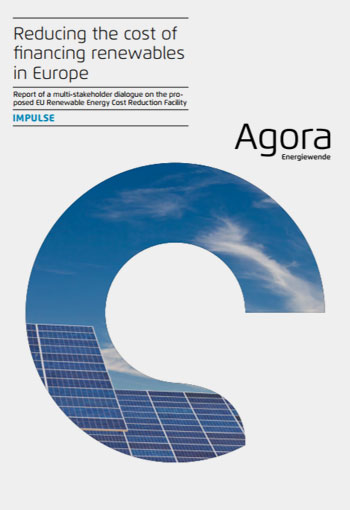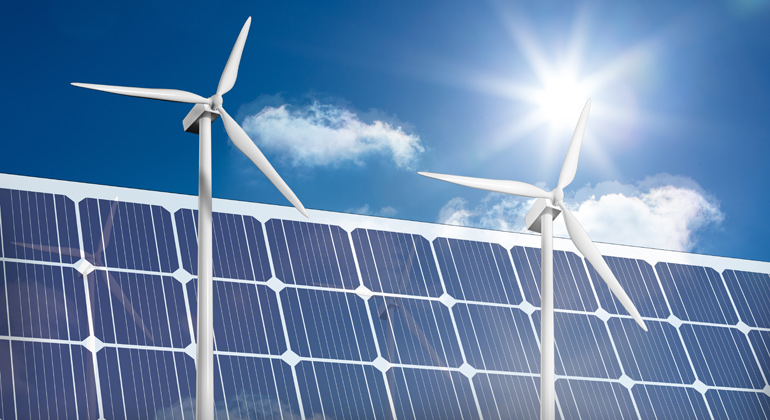How the EU can make the increase of renewable energies in Central and South-Eastern Europe cheaper and faster
An EU guarantee programme will significantly lower the financing costs and risks for renewable energy investments in Europe. Agora Energiewende makes a concrete proposal for the EU legislator.
An EU guarantee programme could significantly reduce the financing costs related to developing Europe’s renewable energy potential: one Euro of public funding for a guarantee scheme would leverage 50 Euros of private investment into wind and solar energy projects. The programme would help EU Member States with high financing costs to develop new renewable energy projects faster and cheaper. It would particularly benefit Member States in Central and South-East Europe and allow these countries to contribute to the European energy transition at the low investment costs seen in Germany or France. This is the main message of a new study by Agora Energiewende. The proposal explained in the study is the result of a multi-stakeholder dialogue process organised by Agora Energiewende in Brussels in 2017.
The proposed European Renewable Energy Cost Reduction Facility would enable all Member States to reap the full benefits of low cost renewable energy technology and to achieve the EU target of a share of at least 27 percent of renewable energy in overall energy consumption by 2030. The European Renewable Energy Cost Reduction Facility would enable banks, investors and project developers investing in higher risk Member States (e. g. Croatia or Greece) to assess the risks of renewable energy projects in a similar way as with projects in lower risk Member States (e.g. Germany or France). This is achieved by shifting the enforcement risk for a specific tariff commitment from the renewable energy project developer to the EU Cost Reduction Facility.
“The European Renewable Energy Cost Reduction Facility should be financed from the new multiannual EU budget after 2020. Our proposal explains how this can be done legally and how much money would be needed, says Matthias Buck, Director for European Energy Policy at Agora Energiewende. “We also propose a pilot project before 2020 to test the concept and its benefits. This could be done by re-committing unused funds from the current EU budget.”
In a few months the European Commission will propose a new multi-annual EU budget for the years after 2020. It has tasked a High Level Expert Group to develop ideas how innovative financing could advance ecological sustainability in Europe. The group will publish its recommendations on 31 January. “Our proposal adds to this discussion and shows concretely, how innovative financing instruments could speed up the European energy transition”, says Matthias Buck.
The guarantee programme will ensure that the dramatic declines in the costs of onshore and offshore wind technology, and in particular for solar PV, translate into declining costs for concrete renewable energy projects all throughout the European Union.
The EU Cost Reduction Facility will make investment into renewable energy cost-competitive with investment into any other generation technology in Central and South-Eastern Europe. It will thereby enable decision-makers in these countries to move faster and further in developing their respective domestic renewable energy potential at lower cost to consumers and taxpayers.
According to the study, the EU Cost Reduction Facility would represent a targeted and cost-effective EU-level intervention to complement and facilitate the implementation of the EU Renewable Energy Directive proposed by the European Commission in November 2016. Article 3.4 of the proposed Directive obliges the European Commission to create an enabling framework for reducing the cost of capital of renewable energy projects and thereby support high ambition of Member States.
The EU Cost Reduction Facility would be financed from the EU budget, whereby this financing could be complemented by collateral financing from beneficiary Member States. If properly implemented, the risk of the financial guarantee underpinning the EU Cost Reduction Facility ever being called is very small. Therefore, the report proposes a set of concrete safeguards for ensuring that only high quality renewable energy investments would benefit and for avoiding over-commitments. In particular, Member States benefitting from the instrument must demonstrate a sustained political and financial commitment to renewable energy and the instrument would be designed so as to phase-out automatically as market confidence in high cost of capital Member States increases.
The new report, “Reducing the cost of financing renewables in Europe”, builds on a previous report released in September 2016, as well as a Multi-Stakeholder Dialogue with representatives from EU institutions, public and private finance, project development and think tanks.
The study can below be downloaded free of charge.
- Reducing the cost of financing renewables in Europe | Report of a multi-stakeholder dialogue on the proposed EU Renewable Energy Cost Reduction Facility









